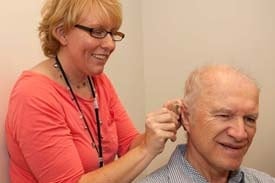Very often, spouses and life-partners will suggest that their loved one has “selective” hearing – a self-made term indicating that they can hear perfectly fine most of the time, but tend not to hear their partner speaking. Is it simply a matter of “tuning out” – or could it be something else?
"Selective Hearing" - or Hearing Loss?
Tags: Hearing Aid, Hearing Aids, Communication, Hearing, Hearing Loss Prevention, Support, Hard of Hearing, Hearing Loss
8 Ways to Encourage a Loved One to Have A Hearing Test
Hearing loss generally happens gradually over a long period of time. Often, the subtle, and not so subtle, signs of hearing difficulty are more apparent to significant partners than it is to the person with the hearing loss.
Tags: Hearing Aid, Hearing Aids, Hearing, Support, Caregiving, Hearing Loss, "ears"
May is Better Hearing & Speech Month
Did you know…
- An estimated 40 million Americans experience speech, language, and/or hearing disorders.
- The second most common reason for special education services in public schools is speech/language impairment.
- 36 million American adults report so
Tags: Speech, Hearing Aid, Audiology, Language, Hearing Aids, Communication, Hearing, reading, literacy, Hearing Loss Prevention, Teens, Support, Caregiving, Hearing Loss, Stuttering, Learning, Voice, toddler, talking, Autism
How Hearing Loss Affects Speech-Language Development
Children learn to talk by listening to those around them. The first few years of life are a critical time for speech and language development. Children must be able to hear speech clearly in order to learn language. Fluctuating hearing loss due to repeated ear infections might mean the child doesn't hear consistently and may be missing out on critical speech information. Permanent hearing loss will also affect speech and language development, especially if it is not detected early. The earlier hearing loss is identified and treated, the more likely the child will develop speech and language skills on par with children who aren’t experiencing hearing issues.
Tags: Speech, Hearing Aid, Hearing Aids, Communication, Hearing, Deaf, Hard of Hearing, Hearing Loss, Learning, Voice, toddler, talking
Top 10 Tips to Adjust to New Hearing Aids
For most people, hearing loss occurs very gradually. The process of getting hearing aids, however, is not gradual. You walk into the audiologist's office, and a few minutes later you're hearing! It takes the brain time to get adjusted to the new sounds you'll be hearing through the hearing aids. To make the adjustment process a little easier, start with easy situations and work your way up to more difficult listening environments.
Tags: Hearing Aid, Audiology, Hearing Aids, Hearing, Hard of Hearing, Hearing Loss
Communication Strategies for People with Hearing Loss
Hearing loss may make conversational speech seem very soft, or may prevent a person from hearing certain speech sounds at all. This is why people with hearing loss often say they can hear people talking, but can’t understand what they’re saying. They may be able to hear some sounds, so they can hear the person’s voice, but the hearing loss is blocking out the sounds that are vital to understanding. Usually, when a person is diagnosed with a hearing loss, hearing aids are recommended. Hearing aids are designed to amplify the sounds that the person needs the most, the sounds that they are unable to hear due to the hearing loss. Unfortunately, hearing aids have limitations and will not restore hearing to normal. Hearing aids are only part of the hearing loss puzzle. The best solution to increase hearing and understanding at the same time is to pair hearing aids with effective communication strategies.
Tags: Hearing Aid, Hearing Aids, Communication, Hearing, Hard of Hearing, Hearing Loss
Buying Hearing Aids: CHSC Audiologists vs. Online or Over the Counter
Cleveland Hearing & Speech Center audiologists are highly trained professionals. We have Doctoral and Master’s degrees in audiology and we have devoted our careers to helping you hear better. At CHSC, We believe that life is improved by successful communication. We are dedicated to helping people hear better so they can fully enjoy the people and activities that bring meaning to each day.
Tags: Hearing Aid, Audiology, Hearing Aids, Communication, Support, Hard of Hearing, Hearing Loss
Ordering Your Hearing Aids
Your Cleveland Hearing & Speech Center (CHSC) audiologist can place an order for your hearing aids. Before you can order a hearing aid, you must have your hearing tested. Once this testing is done, you should talk with your audiologist to decide which hearing aids are best for you, your hearing loss, and your lifestyle. Next, the audiologist will take an impression of your ear. During this process, she will put a putty-like material in your ear for about five to ten minutes. This material will harden to the shape of your ear so the hearing aid company can make your custom hearing aid.
Tags: Hearing Aid, Audiology, Hearing Aids, Hearing, Hearing Loss
What is Hearing Loss?
Impairments in hearing can happen in either frequency (the high or low pitch of a sound) or intensity (the volume of a sound), or both. For example, a person may not be able to hear very high-pitched noises like a whistle, or they may not be able to hear the TV unless the volume is turned up – or both. Hearing loss severity is based on how well a person can hear the frequency or intensities most often associated with speech. Severity can be described as mild, moderate, sever, or profound. Hearing loss can be congenital (occurring from the time of birth) or acquired (developing later in life after a period of normal hearing). Hearing loss can affect one or both ears – and in different degrees of severity in each ear. A loss that affects one ear is called a “unilateral” (one-sided) hearing loss. A loss that affects both ears is called a bilateral (two-sided) hearing loss.
Tags: Audiology, Hearing Aids, Hearing, Hard of Hearing, Hearing Loss
Assistive Listening Devices Can Boost Your Hearing
When your hearing aids do not provide enough help in certain environments, or if you don’t wear hearing aids but need help hearing only in certain situations, you may want to consider an assistive or alerting device. Discuss with your audiologist which devices might be helpful to you. At CHSC, we offer a variety of devices and can you determine which is right for you.
Tags: Audiology, Hearing Aids, Communication, Hearing, Hearing Loss

















